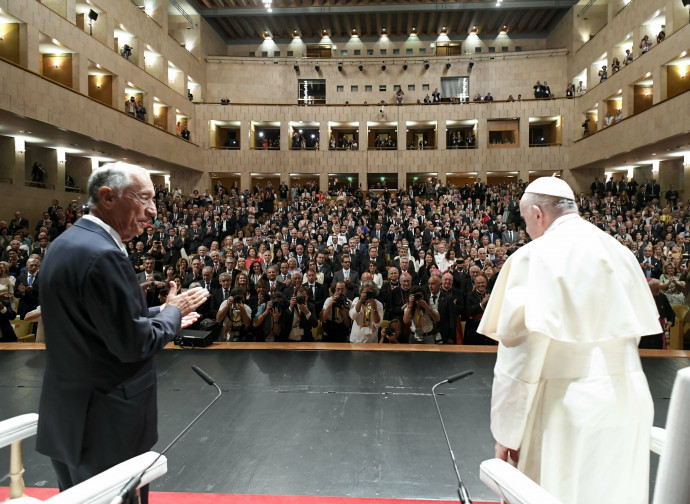'Melting-Pope' at WYD omits God in speech to authorities
Meeting with rulers and diplomats, Francis extolled globalism and invited young people to cultivate the "desires of unity, peace, and fraternity": a proposal hardly distinguishable from worldly desires.

One of Francis' most important speeches at World Youth Day in Lisbon was certainly the one he delivered on Wednesday 2 August before the civil authorities and the diplomatic corps. Due to the nature of the recipients, it was a speech addressed to the world, not to those within the Church, and his words on social, political, and economic issues are indicative of how he understands the Church's proposal in the field of its Social Doctrine.
We can say that the two characteristic points of the speech are the accentuated 'globalism' on one hand and the silence on Jesus Christ on the other. As he always does, and on this occasion too, Francis pushed the accelerator towards a world governance that is the fruit of an unspecified fraternity and fuelled by a confused hope which pretends to manage all the phenomena of today. As for Christ, Francis conducted his entire speech without ever mentioning Him, until the conclusion, when, speaking of the hope that must animate the planetary community at this moment, he said: [hope] "which we Christians learn about from the Lord Jesus Christ"; this means that others can learn it equally well elsewhere: Christ as one of the many teachers of hope.
One might think that addressing politicians and ambassadors one should make a secular and profane speech and that, therefore, Francis did well to aim low, without mentioning faith and religion, that he did well to limit himself to nature without bringing up the supernatural. Perhaps from the listeners' point of view this is true, but from the pope's point of view it cannot be true. Indeed, nothing takes place on the natural plane that does not reflect the influence of the supernatural on it. Revelation and grace directly invest the natural plane, not to replace the responsibilities proper to that level, but to teach them that the ultimate goal is another.
The abandonment of the natural plane to itself, which occurs even when it is spoken of at its own level, is called naturalism. It assumes that the injustices and difficulties of social life can find capacity and possibilities for resolution within themselves, without any divine support and help. It is a known fact that Francis conducts his socially motivated speeches without reference to Christ. But it is difficult, and perhaps impossible, to become accustomed to it.
The marginalisation of Christ in this discourse goes hand in hand with the strong globalist thrust. Right now, many centres of power are in action for a systemic transformation of the organisation of life on the planet. While in many passages of his speech, Francis expressed concern about how these global actors threaten peace, produce poverty, and build submission, in many others and in the overall tone of the discourse, he pushes favourably for the demolition of all differences, for a post-identitarian, mestizo, multicultural and multireligious global society.
He expresses no critical appraisal of the homologation of national and cultural characters in the new global melting-pot and embraces the causes so dear to the supporters of the Great Reset, such as the so-called climate emergency and a completely open management of migration. In other words, he largely embraces precisely that globalist ideology for which Christ must be at best "one of the many". It is very difficult, reading this speech by Francis, to distinguish the positions of the Catholic Church from those of the Davos WEF or the Open Society Foundations.
Lisbon and Portugal are not extolled for having brought Christianity to the world, but for being a 'multi-ethnic and multi-cultural' society, for breathing the air of the ocean, “which recalls the importance of the whole, of thinking of borders as areas of contact, not as boundaries that separate”. Lisbon is remembered for having hosted the work of the revision of the Constitutive Treaty of the European Union, identified with Europe, so that Brussels would now have the role of carrying on the task of Europe, not to be understood, of course, as the revival of Christian Magna Europa, but as “initiating processes of dialogue and inclusion, developing a diplomacy of peace that settles conflicts and lessens tensions”.
Francis' Europe (or European Union?) is no longer the Christian Europe, but the Europe that rediscovers "its young soul", dreams of "the greatness of the whole", goes beyond "the needs of the immediate", includes "peoples and persons", does not resort to "theories and ideological colonisation". All things for which Christ is of little use. Francis wishes young people to cultivate "desires for unity, peace, and fraternity" to "realise their dreams", to "build together", to "create new things", to "put out to sea and sail together towards the future". Indications devoid of content, which the young people of Lisbon could apply, without grasping the differences, to the proposals of posthuman and irreligious neo-globalism.
